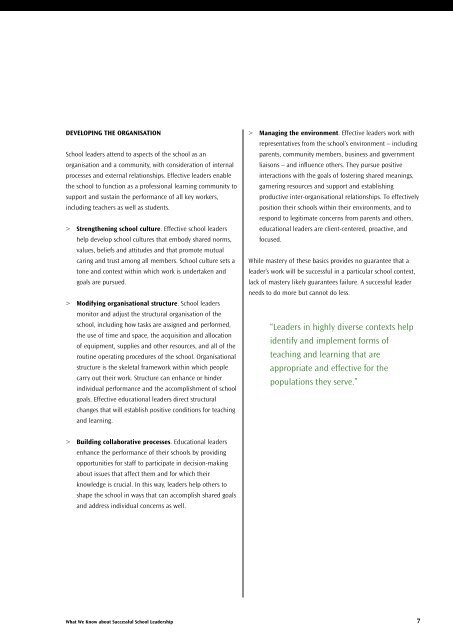randd-leithwood-successful-leadership
randd-leithwood-successful-leadership
randd-leithwood-successful-leadership
Create successful ePaper yourself
Turn your PDF publications into a flip-book with our unique Google optimized e-Paper software.
DEVELOPING THE ORGANISATION<br />
School leaders attend to aspects of the school as an<br />
organisation and a community, with consideration of internal<br />
processes and external relationships. Effective leaders enable<br />
the school to function as a professional learning community to<br />
support and sustain the performance of all key workers,<br />
including teachers as well as students.<br />
> Strengthening school culture. Effective school leaders<br />
help develop school cultures that embody shared norms,<br />
values, beliefs and attitudes and that promote mutual<br />
caring and trust among all members. School culture sets a<br />
tone and context within which work is undertaken and<br />
goals are pursued.<br />
> Modifying organisational structure. School leaders<br />
monitor and adjust the structural organisation of the<br />
school, including how tasks are assigned and performed,<br />
the use of time and space, the acquisition and allocation<br />
of equipment, supplies and other resources, and all of the<br />
routine operating procedures of the school. Organisational<br />
structure is the skeletal framework within which people<br />
carry out their work. Structure can enhance or hinder<br />
individual performance and the accomplishment of school<br />
goals. Effective educational leaders direct structural<br />
changes that will establish positive conditions for teaching<br />
and learning.<br />
> Managing the environment. Effective leaders work with<br />
representatives from the school’s environment – including<br />
parents, community members, business and government<br />
liaisons – and influence others. They pursue positive<br />
interactions with the goals of fostering shared meanings,<br />
garnering resources and support and establishing<br />
productive inter-organisational relationships. To effectively<br />
position their schools within their environments, and to<br />
respond to legitimate concerns from parents and others,<br />
educational leaders are client-centered, proactive, and<br />
focused.<br />
While mastery of these basics provides no guarantee that a<br />
leader’s work will be <strong>successful</strong> in a particular school context,<br />
lack of mastery likely guarantees failure. A <strong>successful</strong> leader<br />
needs to do more but cannot do less.<br />
“Leaders in highly diverse contexts help<br />
identify and implement forms of<br />
teaching and learning that are<br />
appropriate and effective for the<br />
populations they serve.”<br />
> Building collaborative processes. Educational leaders<br />
enhance the performance of their schools by providing<br />
opportunities for staff to participate in decision-making<br />
about issues that affect them and for which their<br />
knowledge is crucial. In this way, leaders help others to<br />
shape the school in ways that can accomplish shared goals<br />
and address individual concerns as well.<br />
What We Know about Successful School Leadership<br />
7





